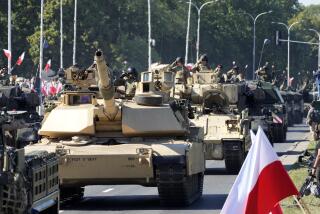U.S. Military Spending
- Share via
Col. Harry Summers Jr. of the Army War College (Commentary, March 28) talks about kidding ourselves regarding military preparedness and about our having reduced military spending since the end of the Cold War. The fact is, we would be kidding ourselves to think that the arms race between the two superpowers during the Cold War did not itself lead the Soviet Union into disunion, collapse and bankruptcy. The Soviets simply could not stand the economic heat that the military spending race generated. Fortunately, we emerged from that fierce Cold War battle incurring only a $5-trillion national debt.
When Summers calls for an increase in our annual quarter-trillion-dollar military budget, perhaps we should take into account his orientation and inspiration. In his position, he has but a single agenda item.
CHARLES R. BARR
Upland
* Re “How Much Defense Is Enough?” editorial, March 25:
You cannot compare the military budget of the U.S. with the budgets of Russia and China. The Russians and Chinese do not have the overseas military and treaty obligations that we have.
You were in favor of our troops going to Bosnia, Haiti, Somalia, the Middle East and the starving nations of Africa. You seem to be for our protecting Taiwan from mainland China. These missions require large manpower commitments, are costly to operate and drain the material reserves of our armed forces.
The primary mission of the U.S. armed forces is, “To protect and defend the Constitution of the United States against all enemies, foreign and domestic.” That includes being ready to fight the small wars, the big land wars, air wars, wars at sea and even thermonuclear war. Planning and preparing for anything less is not realistic if we intend to survive as a republic.
ANTHONY T. DUNN
San Diego
More to Read
Get the L.A. Times Politics newsletter
Deeply reported insights into legislation, politics and policy from Sacramento, Washington and beyond. In your inbox three times per week.
You may occasionally receive promotional content from the Los Angeles Times.










